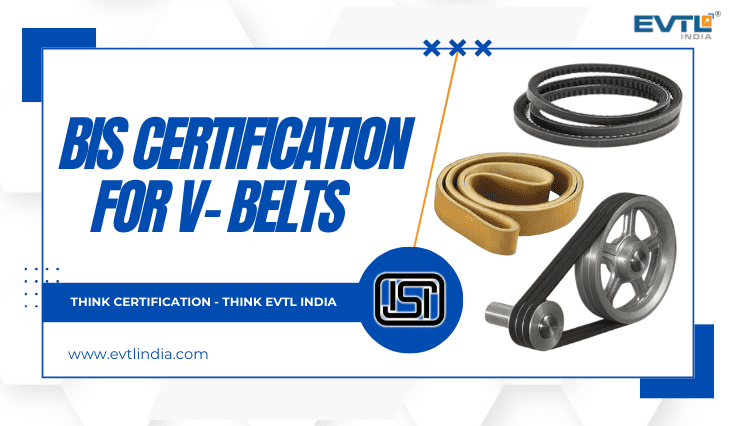V-Belts play a crucial role in numerous industrial applications, from driving machines in manufacturing units to powering mechanical systems in automotive industries. Ensuring the quality and safety of these belts is essential for maintaining operational efficiency and minimizing downtime. In India, the Bureau of Indian Standards (BIS) regulates the manufacturing and distribution of V-Belts through the ISI Certification for V-Belts, a mandatory quality assurance process. This article explores the BIS certification for V-Belts, the related Indian standards, and the recent Quality Control Order (QCO) issued by the Ministry of Commerce and Industry.</span><span style=" font-size:="" 18px;="" font-family:="" arial;"="">
What is BIS Certification for V-Belts?
Here are the key standards that govern the manufacturing and certification of V-Belts in India:
The Importance of the ISI Mark for V-Belts
V-Belts
(Quality Control), Order 2024
Key Provisions of the 2024 Quality Control Order
The QCO covers
the following types of V-Belts:
1. General Purpose Endless V-Belts as per IS2494 (Part 1): 1994
2. Fire Resistant and Antistatic Endless V-Belts as per IS 2494 (Part 2): 1993
3. Transmission Devices – Endless Narrow V-Belts as per IS 14261: 1995
Mandatory BIS Certification: According to the QCO, all manufacturers must obtain BIS certification for these products to use the ISI Mark. Without this certification, it is illegal to manufacture or sell these products in India.
Penalties for Non-Compliance: Any manufacturer or distributor who fails to comply with this order is liable for penalties under the Bureau of Indian Standards Act, 2016. This includes fines or even imprisonment, depending on the severity of the violation.
This order is a critical step toward enforcing higher quality standards for V-Belts, ensuring that they meet both performance and safety expectations. As V-Belts are integral to industrial operations, this regulation aims to safeguard the interests of both manufacturers and end-users.
BIS
Certification Process for V-Belt Manufacturers
The BIS
certification process for V-Belts involves multiple steps, designed to
thoroughly evaluate a product's compliance with the required standards. Here is
a general overview of the certification process:
1. Application Submission: Manufacturers
must submit an application form along with required documentation to BIS.
2. Documentation Review: BIS reviews the
submitted documents to ensure completeness and correctness.
3. Factory Inspection: BIS officials
conduct an on-site inspection of the manufacturing facility to assess the
production process and quality control measures.
4. Sample Testing: Product samples are
taken and tested in BIS-approved laboratories to verify compliance with Indian
standards.
5. Certification Grant: Upon successful
completion of the inspection and testing, BIS grants certification, allowing
the manufacturer to use the BIS mark on their products.
Documents
Required for BIS Certification
To apply for BIS
certification for V-Belts, manufacturers need to submit the following
documents:
● Application form
● Manufacturing process details
● Quality control plan
● Test reports from BIS-approved
laboratories
● Factory layout and equipment
details
● Proof of business registration
● Product specifications and
technical details
● Declaration of conformity to
Indian standards
Additionally,
manufacturers may be required to provide proof of compliance with environmental
and safety regulations, depending on the specific type of product being
certified.
Benefits of BIS Certification for V-Belts
BIS certification offers several advantages, both for manufacturers and consumers:
● Market Access: For manufacturers, obtaining ISI Certification for V-Belts opens up the Indian market, allowing themto legally sell their products while complying with government regulations.
● Consumer Confidence: The ISI Mark instills confidence in buyers, assuring them that the product they are purchasing has been tested and meets the high standards set by the BIS.
● Quality Assurance: BIS certification ensures that V-Belts are made with materials and processes that guarantee long-lasting performance, efficiency, and safety, even in demanding industrial environments.
● Competitive Edge: Manufacturers with BIS certification often gain a competitive advantage over those who do not comply, as buyers tend to favor certified products for their reliability and compliance with national standards.
Conclusion
In conclusion,
the BIS certification for V-Belts is
a critical requirement that ensures the quality, safety, and efficiency of
these essential industrial components. The recent Quality Control Order (QCO) of 2024 reinforces the need for
compliance, mandating that manufacturers must adhere to the relevant Indian
Standards for V-Belts and obtain BIS certification before selling their
products in the Indian market.
This regulatory framework not only helps protect consumers but also promotes fair competition and enhances the overall quality of industrial products in India. For manufacturers, it is essential to follow the guidelines, obtain the ISI Certification for V-Belts, and continue delivering products that meet the nation's quality standards.
Navigating the BIS certification
process can be challenging, especially for small and medium-sized enterprises.
EVTL India is a leading consultancy firm dedicated to assisting manufacturers
in obtaining BIS certification (ISI Mark) efficiently. With expertise in
managing BIS portal submissions, documentation, and regulatory fees, EVTL India
ensures a smooth and successful certification process. By choosing EVTL India,
manufacturers can enhance their product's marketability both in India and
internationally, securing a competitive edge. Additionally, EVTL India provides
ongoing support post-certification, helping manufacturers maintain compliance
with BIS standards and renew their licenses as needed.





















